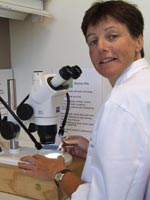
Beneficial bugs sought for cereal crops

Dr Joanne Holloway's latest
research is into beneficial insects
in cereal crops.
The wheat industry could be just a few years away from using beneficial insects to help control insect pests, as a result of research being undertaken into developing integrated pest management (IPM) strategies for broadacre cereal crops.
Next month NSW Department of Primary Industries (DPI) entomologist, Dr Jo Holloway, will start surveying farms in the Riverine Plains for the presence of insects which prey on key pests of wheat, canola and lucerne in southern NSW.
Ten farms will be surveyed three times a year, over the next three years, during various phases in the cropping cycle, throughout the project funded by DPI and the Grains Research and Development Corporation.
“In the first year, we’ll be scoping what predatory insects are out there, such as spiders, lacewings, lady beetles, rove and other predatory beetles.
“The beneficial species we’ll be looking for are those that eat one or more of the pest species, but not the crops themselves”, Dr Holloway said.
One of their advantages is that they help combat those pest species that are not easily treated with chemicals, such as the wheat curl mite which spreads wheat streak mosaic virus.
IPM strategies are standard practice in horticulture and the cotton industry, and are credited with leading to significant reductions in chemical use.
Dr Holloway said this is believed to be the first time that IPM strategies are being developed for broadacre cereal crops in Australia.
“In years 2 and 3 of the project we will be looking at farmers’ spraying regimes – the use of harsh or soft chemicals, rate of application and timing of spraying.
As well as killing pest species, broad spectrum chemicals also kill many of the beneficial species and this may actually lead to heavier infestations of pest species in the long term.
“We’ll be asking: Is there a beneficial insect regime that we can promote that will ultimately help reduce chemical use in this industry?”
Further information
Dr Joanne Holloway, NSW DPI, Wagga on 02 6938 1605 or joanne.holloway@dpi.nsw.gov.au.
Email:

